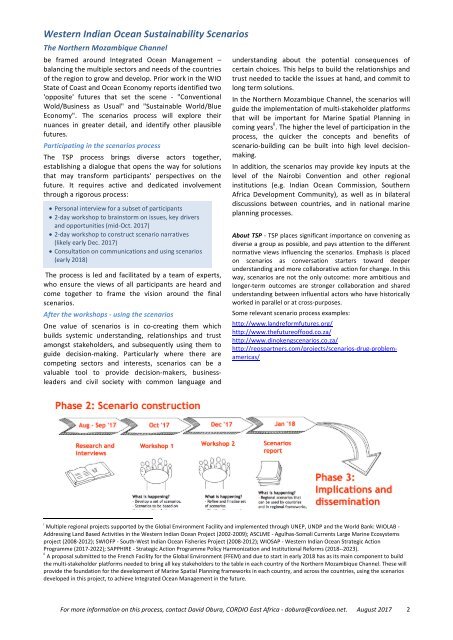NMCi scenarios 2017
NMCi scenarios 2017
NMCi scenarios 2017
You also want an ePaper? Increase the reach of your titles
YUMPU automatically turns print PDFs into web optimized ePapers that Google loves.
Western Indian Ocean Sustainability Scenarios<br />
The Northern Mozambique Channel<br />
be framed around Integrated Ocean Management –<br />
balancing the multiple sectors and needs of the countries<br />
of the region to grow and develop. Prior work in the WIO<br />
State of Coast and Ocean Economy reports identified two<br />
'opposite' futures that set the scene - "Conventional<br />
Wold/Business as Usual" and "Sustainable World/Blue<br />
Economy". The <strong>scenarios</strong> process will explore their<br />
nuances in greater detail, and identify other plausible<br />
futures.<br />
Participating in the <strong>scenarios</strong> process<br />
The TSP process brings diverse actors together,<br />
establishing a dialogue that opens the way for solutions<br />
that may transform participants' perspectives on the<br />
future. It requires active and dedicated involvement<br />
through a rigorous process:<br />
• Personal interview for a subset of participants<br />
• 2-day workshop to brainstorm on issues, key drivers<br />
and opportunities (mid-Oct. <strong>2017</strong>)<br />
• 2-day workshop to construct scenario narratives<br />
(likely early Dec. <strong>2017</strong>)<br />
• Consultation on communications and using <strong>scenarios</strong><br />
(early 2018)<br />
The process is led and facilitated by a team of experts,<br />
who ensure the views of all participants are heard and<br />
come together to frame the vision around the final<br />
<strong>scenarios</strong>.<br />
After the workshops - using the <strong>scenarios</strong><br />
One value of <strong>scenarios</strong> is in co-creating them which<br />
builds systemic understanding, relationships and trust<br />
amongst stakeholders, and subsequently using them to<br />
guide decision-making. Particularly where there are<br />
competing sectors and interests, <strong>scenarios</strong> can be a<br />
valuable tool to provide decision-makers, businessleaders<br />
and civil society with common language and<br />
understanding about the potential consequences of<br />
certain choices. This helps to build the relationships and<br />
trust needed to tackle the issues at hand, and commit to<br />
long term solutions.<br />
In the Northern Mozambique Channel, the <strong>scenarios</strong> will<br />
guide the implementation of multi-stakeholder platforms<br />
that will be important for Marine Spatial Planning in<br />
coming years ii . The higher the level of participation in the<br />
process, the quicker the concepts and benefits of<br />
scenario-building can be built into high level decisionmaking.<br />
In addition, the <strong>scenarios</strong> may provide key inputs at the<br />
level of the Nairobi Convention and other regional<br />
institutions (e.g. Indian Ocean Commission, Southern<br />
Africa Development Community), as well as in bilateral<br />
discussions between countries, and in national marine<br />
planning processes.<br />
About TSP - TSP places significant importance on convening as<br />
diverse a group as possible, and pays attention to the different<br />
normative views influencing the <strong>scenarios</strong>. Emphasis is placed<br />
on <strong>scenarios</strong> as conversation starters toward deeper<br />
understanding and more collaborative action for change. In this<br />
way, <strong>scenarios</strong> are not the only outcome: more ambitious and<br />
longer-term outcomes are stronger collaboration and shared<br />
understanding between influential actors who have historically<br />
worked in parallel or at cross-purposes.<br />
Some relevant scenario process examples:<br />
http://www.landreformfutures.org/<br />
http://www.thefutureoffood.co.za/<br />
http://www.dinokeng<strong>scenarios</strong>.co.za/<br />
http://reospartners.com/projects/<strong>scenarios</strong>-drug-problemamericas/<br />
i<br />
Multiple regional projects supported by the Global Environment Facility and implemented through UNEP, UNDP and the World Bank: WIOLAB -<br />
Addressing Land Based Activities in the Western Indian Ocean Project (2002-2009); ASCLME - Agulhas-Somali Currents Large Marine Ecosystems<br />
project (2008-2012); SWIOFP - South-West Indian Ocean Fisheries Project (2008-2012); WIOSAP - Western Indian Ocean Strategic Action<br />
Programme (<strong>2017</strong>-2022); SAPPHIRE - Strategic Action Programme Policy Harmonization and Institutional Reforms (2018--2023).<br />
ii<br />
A proposal submitted to the French Facility for the Global Environment (FFEM) and due to start in early 2018 has as its main component to build<br />
the multi-stakeholder platforms needed to bring all key stakeholders to the table in each country of the Northern Mozambique Channel. These will<br />
provide the foundation for the development of Marine Spatial Planning frameworks in each country, and across the countries, using the <strong>scenarios</strong><br />
developed in this project, to achieve Integrated Ocean Management in the future.<br />
For more information on this process, contact David Obura, CORDIO East Africa - dobura@cordioea.net. August <strong>2017</strong> 2


















